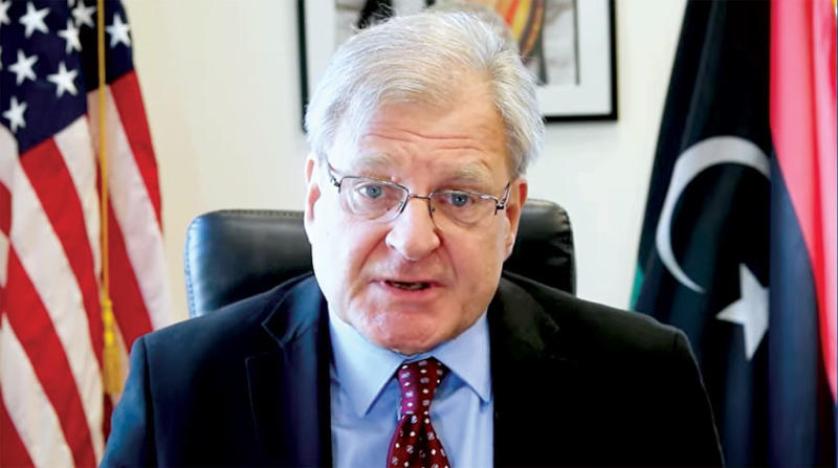Ambassador Richard Norland: It was the Libyans who chose the date of the elections, and America strongly supported their desire to meet this date.
Pulbished on:
Tripoli, January 8, 2022 (LANA) - The US ambassador, and its special envoy to Libya, Richard Norland, said that the current period in which the country is living is "a test of the goodwill of the Libyan leaders who say they are committed to the elections", but he indicated that those he called not serious among them will find a million Reason for delay.
Norland, expressed in statements to “Asharq Al-Awsat” published today, Saturday, his belief that “good leaders will now actively participate in trying to get things back on the right track as soon as possible,” stressing his country’s support for this path, and “that it will continue to work in coordination with the international partners to achieve this goal.’’
Regarding his vision of the reasons that led to the delay in the entitlement, Norland said that “Libyan politics is complex; It is difficult for outside observers to determine the exact reasons for this.” He continued: “As an observer, it seemed to me that the emergence of some (contradictory nominations) relatively late in the electoral process led to fears of an outbreak of violence; This prompted at least a temporary pause.’’
The US ambassador pointed out that the High National Elections Commission was technically ready to hold the elections on time, but its work was confused by the "contradictory nominations", saying that some parties were more than happy to seize opportunities to delay the electoral process.
The American diplomat considered that the Libyan political figures evaded the responsibility of announcing the postponement of the elections for fear of the people being held accountable for them, “proves that the decision of the United States to support holding the elections on time was not a naive decision or a misreading of the Libyan political and security reality, as some say, and then These personalities share responsibility for what happened.”
"I do not accept the opinion of those who said that we were naive to believe that the elections could take place on December 24, and this is confirmed by the fact that no political figure wants to take responsibility for the announcement of this postponement," he said. And he added: “To this day, no serious political figure wants to link it to the position of postponing the elections, because they know that the people want the elections to be held as soon as possible. And they see that there is a kind of accountability to the people, and this is a promising sign.”
He pointed out that, "It was the Libyans who chose the date of the elections, and the United States strongly supported their desire to fulfill this date, despite the flaws in the electoral law," noting that "there was a real movement towards holding the elections, at least until the issue of (controversial candidates) erupted by their participation in the electoral process.’’
Norland noted that the commission's technical preparations "were highly professional and efficient, and the most serious political actors in Libya, at least, were in favor of the elections."
On the threats made by the United States to obstructing the elections, the ambassador said that “the discussion of sanctions is mostly related to the personalities who refused to accept the results of the elections, or those who practiced violence threatening to obstruct the electoral process,” hinting that “the matter has not been resolved yet, and a decision may be taken in this regard Later".
He criticized the rumors that his country lost enthusiasm for the electoral process, and allowed its collapse at the last moments, as it realized in the late hours that its results may not lead to the creation of a unified authority with which the US administration can coordinate on many of Washington’s priorities in the Libyan file, and said: “This is not true. Our position has been clear and consistent throughout.”
"We supported the strong desire of the Libyan people to elect a sovereign, united and legitimate government in order to move the country onto a firm path toward stability and prosperity," he added.
He believed that "the establishment of a strong Libyan state serves the interests of the Libyan people, the interests of Libya's neighbors and the region more broadly, as well as American interests. Therefore, our country did not support or oppose the candidacy of any personality."
Regarding the discussion that postponing the elections might enhance the influence of some armed formations, Norland said, “We have the impression that a number of these formations were supportive of the elections on their previous date, because, like most political actors, they realize that this is what the majority of Libyans want.”
The US envoy considered that "there is an opportunity to build in Libya on the previous cease-fire and the broad political dialogue that was conducted over the past year, and is still in force today, with the aim of returning the elections to the right track in a reasonable period of time."
Ambassador Norland concluded his remarks to Asharq Al-Awsat, saying: "Free, fair and inclusive elections can lead to a democratic government that better serves the interests of the Libyan people."
=Lana=




